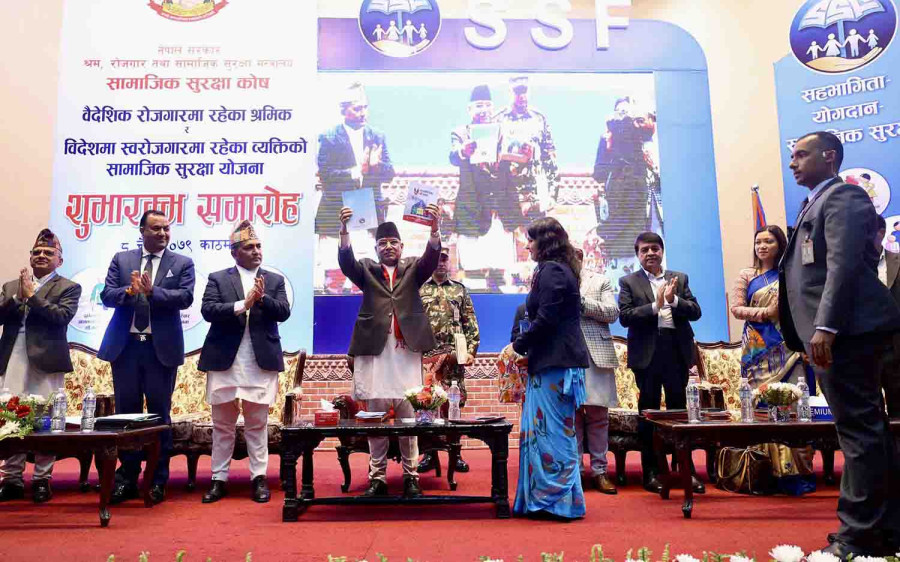Money
Migrant workers enlisted in social security scheme
The scheme which covered only formal private sector workers has been expanded to migrant workers and self-employed persons abroad.
Pawan Pandey
Manju Thapaliya, a Nepali caregiver based in Israel, became the first migrant worker to sign up for the contribution-based Social Security Fund on Wednesday after the government formally expanded the scheme to include migrant workers and self-employed persons abroad.
Last December, the Ministry of Labour, Employment and Social Security passed two working guidelines–one related to migrant workers and the other related to informal sector workers and self-employed persons in the country–thus enlarging the social safety net.
The enlistment of informal sector workers in the scheme will begin next month, government officials said.
The inclusion will not only benefit the hundreds of thousands of migrant workers but also help the government to collect funding, they said.
Launched in November 2018, the social security scheme has covered only formal private sector workers so far.
Migrant workers or self-employed persons based abroad will have to contribute at least Rs2,002 monthly, equivalent to 21.33 percent of the minimum basic monthly salary fixed by the Nepal government for domestic industrial workers. The maximum amount they can pay into the scheme is three times the minimum basic salary.
While the minimum monthly salary determined by the government is Rs15,000, the minimum basic monthly salary is Rs9,385.
Kapilmani Gyawali, executive director at the Social Security Fund, said that a 10 percent discount will be given to workers depositing more than six months' premiums in advance.
“The 20 percent premiums deposited by workers who do not take any benefits from the social insurance scheme in three years will be reimbursed,” said Gyawali.
The guidelines for informal sector workers and self-employed persons in the country envision offering financial security under four categories.
The first support scheme is for regular medical check-ups, health protection and maternity plans.
The second is support for accident and disability plans. The third is support for the dependent family, and the last one is the old-age security plan.
Migrant workers and self-employed persons living abroad, however, will be entitled to receive three of the four benefits—except medical treatment, health protection and maternity coverage.
While 7.48 percent of the contribution made by migrant and self-employed workers abroad will be collected to cover accidents and disability cases as well as the dependent family plan, 13.25 percent will go for the old-age security plan, according to the guidelines.
Under the accidents and disability plan, the fund will bear yearly hospital expenses of up to Rs100,000.
In case of death, a sum of Rs25,000 will be provided to the family to carry out the funeral rites.
Those who sustain injuries and become unable to work for a temporary period will be eligible for a monthly benefit equal to Rs5,631, or 60 percent of their minimum basic salary–until they recover and rejoin work.
In case of permanent disability, the fund will pay the contributor a lifetime monthly pension.
Other financial assistance will be provided to the family through a pension plan for the widow or widower and an educational allowance, each amounting to Rs3,754, or 40 percent of the minimum basic salary of the contributor.
While the pension will be provided on a monthly basis for a lifetime, the educational allowances will be paid until the child reaches 18 years of age or continues to study until they complete 21 years.
Gyawali says migrant workers can register with the fund through the Foreign Employment Information Management System (FEIMS) when they get a new labour approval before departing or re-entry labour approval at Nepali foreign missions, as well as through the Social Security Fund’s website.
The government recently removed the fixed-term labour approval provision for foreign employment, and decided to issue approvals for the period of the contract the workers have signed with their employers.
“To facilitate registration and making deposits, the fund has brought into operation a Viber and Whatsapp group besides a 24/7 free-of-cost call centre 1116,” said Gyawali. “The assurance of cooperation given by institutions of the Non-Resident Nepali Association in more than 80 countries has boosted our confidence.”
Roshan Koju, director at the fund, said that payments could also be made through Connect IPS, and other digital payment gateways such as Khalti, eSewa and Fonepay. “A process is underway to make payments possible through remittance companies in the destination countries.”
Chirag Man Singh Kunwar, general secretary of the Joint Trade Union Coordination Centre, an umbrella organisation of trade unions, said that the inclusion of migrant workers under the social security net resulted from a long struggle for workers' rights and protection.
“Regarding informal sector workers, the government should either assist them in their transition to the formal economy or support their inclusion in the social security net,” said Kunwar.
“It has been planned that to enrol informal sector workers in the fund from next month, they will contribute at least Rs1,032 and the government will chip in Rs880 every month in the fund,” he said.
“It is a commendable step, but it requires effective implementation since around 85 percent of those employed in Nepal are in the informal sector.”
“The expansion of contribution-based schemes could relieve the government to some extent from financial pressure amid increasing social security liabilities,” said chief secretary Shanker Das Bairagi. “It will also create a national capital which needs to be properly managed and utilised.”
Rabina Thapa, president of the Non-Resident Nepali Association, said that consideration needs to be made regarding the premium for women workers because of the gender pay gap.




 8.26°C Kathmandu
8.26°C Kathmandu














